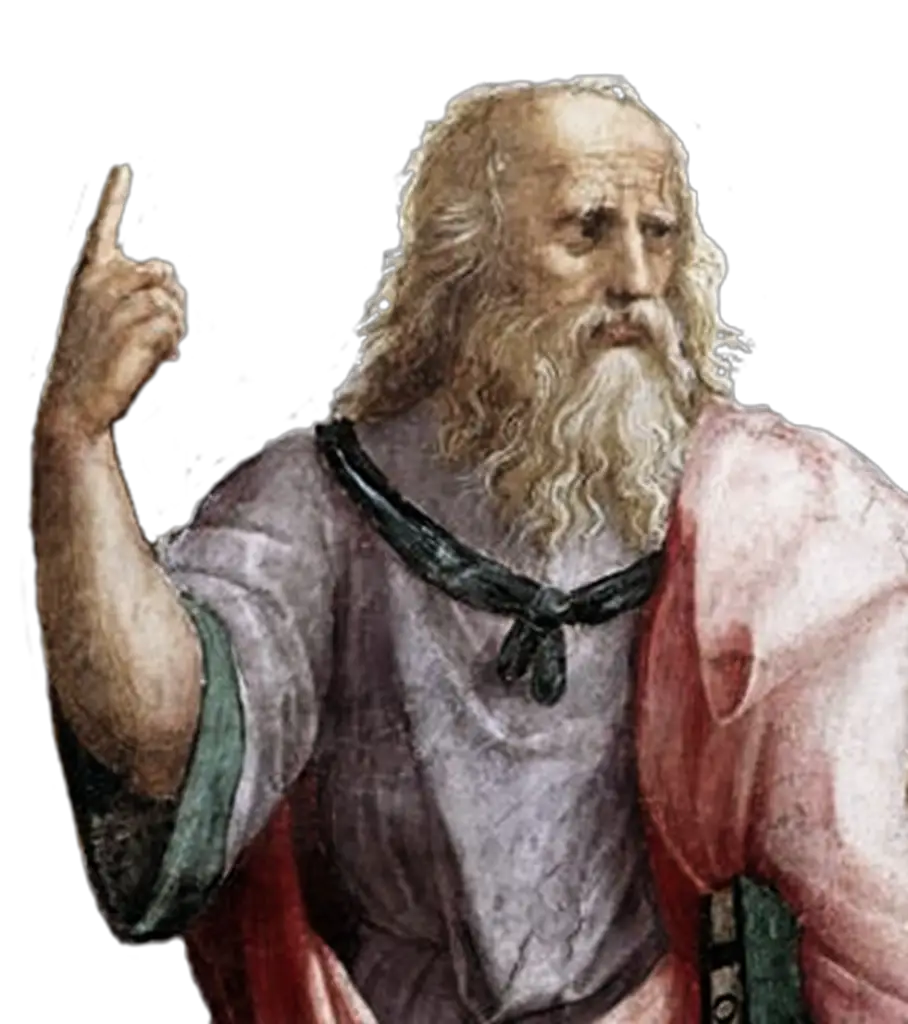|
Getting your Trinity Audio player ready...
|
As one of the most celebrated philosophers of all time, Plato’s legacy has stood the test of time. His influence on Western thought has been profound, shaping our understanding of everything from politics to metaphysics. But what was Plato best known for?
Was Plato best known for his political philosophy or his theory of Forms? The surprising truth is Plato’s contributions to philosophy are more complex and multifaceted than most people realise. This article explores Plato’s life, work, and philosophy, and uncovers the truth about his enduring legacy.
Plato’s Life and Work
Plato was fortunate to live well into old age, and his life and work continue to be relevant in modern times. In this section, we introduce Plato the man and his Philosophy.
Early life and Education

Plato was born into a wealthy family, his father a descendant of royals, and his mother related to a well-known policy-maker.
They gave him a robust education, which included the arts. We know Plato was a student of Socrates’, but it is a lesser-known fact Plato studied under Cratylus before Socrates.
And as he did with Socrates, he incorporated Cratylus beliefs in his work.
Dialogues and Philosophy
One feature of Plato’s work he is best known for are his dialogues, which are a collection of unique philosophical works. Rather than writing his out theories in the traditional way, Plato shaped his works as a dialogue between two people. Socrates, who famously wrote nothing down, inspired this mode of writing .
Socrates preferred to conduct his philosophy through conversation. His Socratic Method used strategic questioning to support people in finding the answers within. This method was a big inspiration to Plato and his work.
His influence on later philosophers
Plato’s influence on philosophy is grand and far-reaching. One of his best-known feats was founding Plato’s Academy (or the Platonic Academy). It was the first higher education institution, where students studied philosophy, science, and mathematics.
Plato affected the students who studied under him, such as Aristotle, a teenager when he enrolled in Plato’s Academy. Aristotle studied directly under Plato and did not leave until he was nearing forty.
The Academy taught students for nearly a millennium and played a huge role in shaping Western education. Philosophy lovers who find themselves in Athens, Greece, can still visit these ruins.

Plato’s Metaphysics
Plato’s metaphysics concentrates on the idea that what we see in the physical world is only half the picture. Plato considered the physical world as a vessel through which the abstract world is funnelled. As theologians see the body as the physical vessel for the soul, which is abstract and non-physical.
Plato’s Theory of Forms
One of the theories that Plato is best known for is his Theory of Forms. He posits that there exists an abstract realm separate from the material world where the truest versions of all that exist in the physical world reside, such as beauty, justice, and truth.
Whereas the material world is ever-changing, the abstract realm holds the original and perfect shape of all that exists. For example, the prototype of beauty exists in this realm.
Plato refers to this realm as the intelligible world, whereas what we can perceive is contained in the sensible world. However, this does not mean that we do not have access to it. Plato theorised that we are all born with an innate knowledge of these forms. This means we recognise them when we see them in the sensible world.
Criticisms of the Theory of Forms
Plato’s Theory of Forms is a radical theory and garnered an unsurprising amount of criticism.
One of the biggest issues is how the Forms can have any relationship with the objects in the real world. For example, how does the Form of Beauty translate to painting in the sensible world? How is it possible for an immaterial soul to inhabit, communicate with, and control a material body?
Another issue to consider is the lack of evidence we have for the idea that humans are born with an innate knowledge of all abstract ideas. The Theory of Forms rests heavily on this idea, and if it is not the case that we are born with innate knowledge, much of Plato’s Theory of Forms breaks down.
Plato on Immortality and The Soul
Plato believed in the idea of a soul and held that souls are immaterial and separate from the material body. He held that the soul is made up of three parts:
- reason,
- spirit, and
- desire.
And he argues that we should all strive to develop and utilise the rational part of the soul to achieve harmony and balance.
He says reason should always be in control. It is the part of the soul that holds knowledge and wisdom and should be constantly engaged as we move through life and make decisions.
The spirit is where courage and honour reside, and it is where our emotions originate. Plato argues that this part of the soul provides us with drive and motivation, but he warns that we must moderate it by reason.
The final element of the soul is desire. This is the part of the soul that is responsible for our appetites. Hunger, thirst, and sexual desire all originate from this part of the soul. Plato said this was the most basic function of our soul, and as with the spirit, the reasonable part of the soul must regulate it.
Immortality and the Afterlife
The death of his mentor, Socrates, moved Plato deeply. Phaedo, one of Plato’s dialogues, takes place on the day of his execution, and discusses morality, the soul, and the afterlife.
Phaedo features Socrates’ friends and disciples having a final discussion. One of Socrates’ disciples, Phaedo of Elis, is depicted as arguing the soul exists outside the physical body and is therefore immortal. He holds that the soul exists before birth and will continue to exist after the death of the material body.
Plato has Phaedo offer four justifications for this view:
- The Opposites Argument
The first justification, the Opposites Argument, is that everything must originate from an opposite. If the body is mortal, the soul must be immortal.
- The Theory of Recollection
The second argument, the Theory of Recollection, argues that we have innate knowledge. For us to be born with innate knowledge, the soul has to be present before birth. This means that it will be present following death, as well.
- The Affinity Argument
The third justification that Plato has Phaedo provide, is the Affinity Argument. This argument claims that there must be non-material things, and that the soul must not be physical. It cannot, therefore, experience material death in the way that the body does.
- The Argument from Form of Life
The final argument in Plato’s Phaedo is the Argument from Form of Life. This argumentassumes that the Theory of Forms is correct and claims that the soul is the Form of Life.
Plato on Morality, Knowledge, and Virtue
In addition to his metaphysical and political philosophy, Plato was heavily involved in the discussion of morality, knowledge, and virtue. He argued that to live a good life we should be most at peace when our actions align with reason. Knowledge and experiences give rise to virtue, and virtue is what allows us to make more ethically sound decisions. That alignment then allows flourishing and a sense of well-being.
Plato’s Political Philosophy
Plato was not a proponent of democracy. Instead, he argued that we should put into power, those with extensive wisdom, knowledge and education . This mode of rule is like technocracy. In this section, we discuss Plato’s ideal state, as discussed in his Dialogue, The Republic, and explore his idea of the Philosopher King.
Plato’s ideal state in The Republic
In The Republic, Plato details his ideal state. Within this state, everyone has a role, and rule is given to those who both display an understanding of the Forms and are highly educated.
For Plato, there were three classes:
Rulers (Philosopher Kings)
Plato argued that government rule should be handed to Philosopher Kings. These men would be enlightened and understand the Forms. This would mean that the Philosopher King would hold an understanding of the perfect Form of Justice, and rule according to the perfect idea of what justice is. A Philosopher Kings had to have fifty years of pointed education before starting his role. This enabled him to lead with reason and logic.
Warriors
Warriors would be tasked with defending society, and would uphold its laws. This means that they would not only be responsible for ensuring the safety of the state from outside threats, but also for maintaining order within the state.
Producers
Finally, the Producers in the society would be responsible for providing goods and services. Under this system, Plato argued that everyone in society had to understand their role, and could hone their virtues according to roles. According to Plato, this gave rise to a peaceful and just society.
Plato’s Legacy
His Influence on Philosophy and Western Thought
Plato’s influence on Western thought cannot be understated. Plato is best known for formalising the study of philosophy after taking the reins from his mentor, Socrates.
His work in founding Plato’s Academy has forever shaped the way we seek and receive education as adults. Higher education is now a staple in our society, and the structure of this education can be traced directly back to Plato.
The Relevance of Plato’s ideas in Modern Philosophy and his Enduring Legacy
Plato’s legacy has caused ripples in the field of Philosophy across the world and remains a staple of philosophy education today. You would be hard-pressed to find a philosophy classroom that does not discuss his views, to at least some extent. His teachings are relevant in the philosophy of politics, epistemology, metaphysics, and more. Many modern philosophical arguments are rooted in Plato’s work – we stand on his giant shoulders.
Final Thoughts
The surprising truth about what Plato was best known for is that his contributions to philosophy were multi-dimensional, complex, and enduring. From his theory of Forms to his political philosophy, Plato’s ideas have shaped the course of Western thought and continue to inspire scholars and thinkers to this day.
Perhaps most importantly, Plato’s legacy reminds us that philosophy is not just an abstract exercise in intellectual inquiry. It has the power to shape our lives, our societies, and our understanding of the world around us. By exploring the philosophical ideas of Plato, we are reminded of the importance of critical thinking, reflection, and intellectual curiosity.
As we reflect on Plato’s enduring legacy, we are reminded of the profound impact that one person can have on the course of human history. His ideas have stood the test of time, inspiring generations of philosophers and thinkers to grapple with the most profound questions about the nature of reality, the human condition, and the meaning of life.
In the end, the legacy of Plato reminds us of the power of ideas to change the world. It encourages us to explore the depths of our own consciousness, to seek truth and wisdom, and to embrace the intellectual journey that lies before us.
Long may Plato’s enduring legacy continue to inspire us to reach for the stars and embrace the infinite possibilities of human thought and inquiry.
FAQs
Q1: What was Plato’s theory of Forms?
A1: Plato’s theory of Forms posits that there is a world of abstract objects, such as truth, beauty, and justice, that exists beyond the physical world. According to Plato, these Forms are eternal, immutable, and provide the basis for all knowledge.
Q2: What was Plato’s view on politics?
A2: Plato’s view on politics is famously outlined in his work The Republic. In it he argues that an ideal state should be ruled by philosopher-kings who are best suited to govern justly and intelligently. Plato believed that only through the establishment of such an ideal state could human beings achieve true justice and happiness.
Q3: What was Plato’s view on the immortality of the soul?
A3: Plato believed in the immortality of the soul, arguing that the soul is eternal and exists before and after the physical body. He believed that the soul is made up of three parts: reason, spirit, and desire, and that the goal of human life is to cultivate the rational part of the soul to achieve a state of harmony and balance.
Q4: What legacy did Plato leave for Western thought?
A4: Plato’s legacy on Western thought is profound and far-reaching. His philosophy has influenced everything from metaphysics and epistemology to ethics and politics. His ideas on the Forms, the nature of reality, and the ideal state continue to be studied and debated by scholars and thinkers today.
Q5: What was Plato’s most enduring legacy?
A5: Plato’s most enduring legacy is his philosophy of critical thinking, reflection, and inquiry. He encouraged his students to question assumptions, challenge established beliefs, and pursue knowledge with an open and curious mind. This legacy has inspired generations of scholars and thinkers to embrace the intellectual journey and to seek truth and wisdom in all aspects of life.

